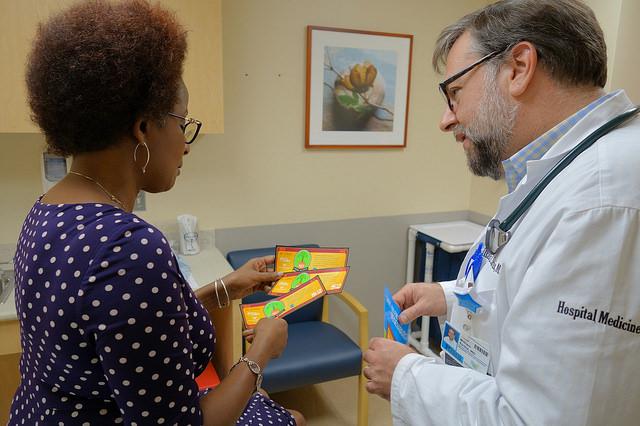At Lankenau Medical Center in Wynnewood, Pa., doctors can "prescribe" Food Bucks, vouchers they can use to buy fresh, healthy food, to their patients. (Department of Agriculture)
Health educators at Lankenau Medical Center, located just outside the western city limits of Philadelphia in Wynnewood, Pa., conduct “pop-up” nutrition classes in waiting rooms. These short classes offer patients new knowledge of fresh produce and prepare them to discuss nutrition with their physician during their appointment. Through the classes, patients receive healthy ingredients from the Deaver Wellness Farm, which is located on the hospital campus, and a recipe to try at home. Health educators conducted over 100 classes in the waiting room, reaching over 1,100 patients in the past year.
The pop-up classes are one example of the community programs and screening implemented as a result of the community health needs assessment to help residents have more affordable and easier access to nutritious foods.
In partnership with The Food Trust and the Philadelphia Department of Public Health’s Get Healthy Philly initiative, Lankenau also piloted a Philly Food Bucks project to work in conjunction with their outpatient practice. Lankenau provides health education, screenings, and community outreach for eight large Philadelphia farmers markets. In partnership with The Food Trust, Lankenau’s Heart Smart Corner Store initiative aims to convert corner stores into a healthy community asset by offering health screenings, nutrition education, and medical referral for at-risk adults.
Hospitals across the country are tackling food insecurity, obesity, and chronic disease while promoting healthy, local, and sustainable food systems. Health Care Without Harm’s “Delivering community benefit: Healthy food playbook” inspires and supports hospital professionals in these endeavors. This past June, Health Care Without Harm held a community benefit forum at Lankenau Medical Center, which is part of Main Line Health, to feature regional examples of best practices and provide a space where participants could strategize on how to successfully implement these interventions through their health system. Participants included food service representatives, wellness professionals, population health professionals, and community partners from Philadelphia, other parts of Pennsylvania, New Jersey, and Baltimore.
